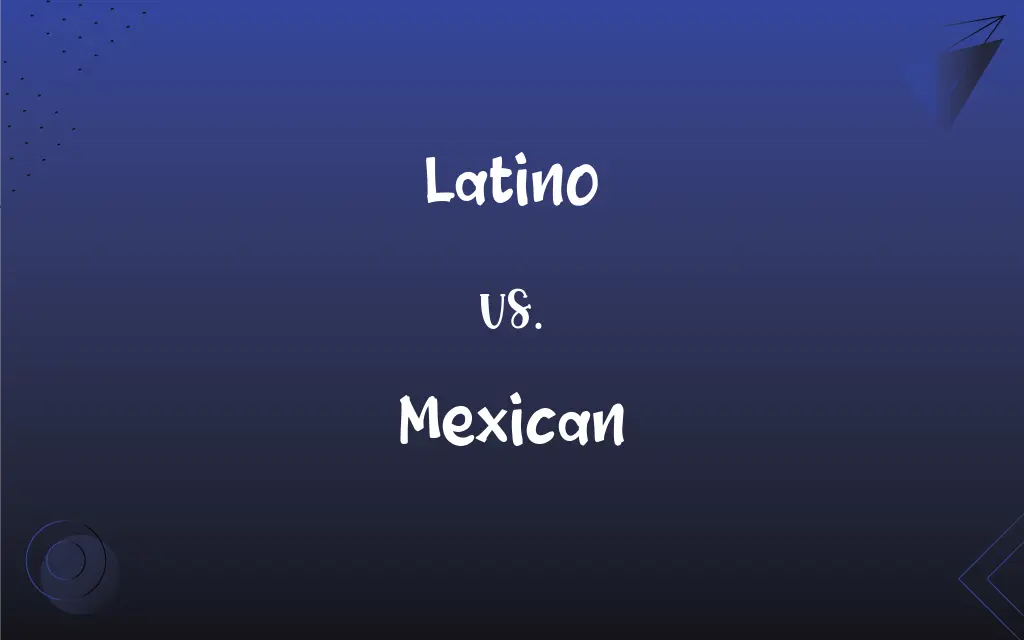Latino vs. Mexican: What's the Difference?
Edited by Aimie Carlson || By Janet White || Published on January 8, 2024
Latino refers to people from Latin America, while Mexican specifically denotes someone from Mexico.

Key Differences
Latino is a term that encompasses people from Latin American countries, which includes South and Central America, and the Caribbean. Mexican specifically refers to people from Mexico, a country in North America.
Latino people share a collective cultural and historical heritage rooted in Latin America. Mexicans, while also Latino, have a distinct culture influenced by indigenous, Spanish, and other historical factors unique to Mexico.
Being Latino does not specify a single nationality but rather a regional and cultural identity. Being Mexican denotes a specific nationality, associated with the country of Mexico.
Latino is a broad term that includes diverse cultures, languages, and ethnicities from Latin America. Mexican culture, while part of this broader Latino identity, has its own unique traditions, cuisine, and arts.
The term Latino is often used in the United States to describe people with roots in Latin America. Mexican, however, is used to specifically identify people from Mexico or with Mexican heritage.
ADVERTISEMENT
Comparison Chart
Geographical Origin
People from Latin America.
People from Mexico.
Cultural Heritage
Diverse cultures of Latin America.
Specific culture of Mexico.
Nationality
Does not refer to a specific country.
Refers specifically to the nation of Mexico.
Language and Ethnicity
Encompasses various languages and ethnicities.
Primarily Spanish-speaking with unique ethnic groups.
Historical Influences
Broad historical influences from Latin America.
Specific historical influences, including Aztec culture.
ADVERTISEMENT
Latino and Mexican Definitions
Latino
A person from Latin America.
She is Latino, hailing from Colombia.
Mexican
Someone who has nationality or heritage from Mexico.
Her family is Mexican, with a long history in Guadalajara.
Latino
Relating to Latin American culture or people.
The Latino festival celebrated diverse traditions.
Mexican
Relating to the culture, people, or language of Mexico.
The Mexican cuisine is known for its rich flavors.
Latino
Someone with heritage from a Latin American country.
His family is Latino, with roots in Argentina.
Mexican
Pertaining to traditions, customs, or artifacts of Mexico.
They love Mexican folk art for its vibrant colors.
Latino
Pertaining to the Spanish or Portuguese-speaking communities in the Americas.
They enjoy Latino music from Brazil.
Mexican
A person from Mexico.
He is Mexican, born in Mexico City.
Latino
A broad term for people of Latin American origin or descent.
She identifies as Latino, embracing her Ecuadorian heritage.
Mexican
A term specifically for people or things from Mexico.
The Mexican fiesta was full of lively music and dance.
Latino
A member of one of the Spanish-speaking peoples of the Americas.
Mexican
A native or inhabitant of Mexico.
Latino
A descendant of any of these peoples, especially when living in the United States. See Usage Note at Hispanic.
Mexican
A person of Mexican ancestry.
Latino
Alternative case form of Latino
Mexican
Of or relating to Mexico or its people, language, or culture.
Latino
An American whose first language is Spanish
Mexican
Of or pertaining to Mexico or its people.
Latino
An artificial language based on words common to the Romance languages
Mexican
A native of inhabitant of Mexico
Latino
Related to or derived from the people or culture of Spain;
The Hispanic population of California is growing rapidly
Mexican
Of or relating to Mexico or its inhabitants;
Mexican food is hot
FAQs
Can all Mexicans be considered Latino?
Yes, Mexicans are a subset of Latinos.
Are all Latinos Mexican?
No, Latinos can be from any Latin American country.
What does Mexican mean?
Specifically denotes someone from Mexico.
Do Latinos share a common culture?
They share cultural similarities but also have diverse individual cultures.
What is unique about Mexican culture?
It has unique influences like Aztec and Spanish elements.
What does Latino mean?
Refers to people from Latin America.
What languages do Latinos speak?
Primarily Spanish and Portuguese, among others.
What regions do Latinos come from?
South and Central America, and the Caribbean.
How do Latinos contribute to diversity in the U.S.?
They bring diverse cultural practices and perspectives.
Is Mexican a nationality?
Yes, it refers to the nationality of people from Mexico.
What language do Mexicans speak?
Mostly Spanish, with some indigenous languages.
Is the term Latino changing in usage?
Yes, its usage and understanding evolve with changing demographics and identities.
Can Latino be used to describe a race?
No, it's more about cultural and regional identity.
Are Mexican traditions different from other Latino cultures?
Yes, they have distinct traditions, food, and art.
What is a typical Mexican dish?
Tacos and enchiladas are famous Mexican dishes.
Is Latino used in countries outside the U.S.?
It's primarily used in the U.S. context.
Do Mexicans identify as Latino in Mexico?
They primarily identify as Mexican within Mexico.
Do Latino and Hispanic mean the same?
Not exactly, Hispanic generally refers to Spanish-speaking countries.
Can someone be Latino and not speak Spanish?
Yes, especially in non-Spanish speaking parts of Latin America.
What are some common Mexican festivals?
Day of the Dead and Cinco de Mayo are well-known.
About Author
Written by
Janet WhiteJanet White has been an esteemed writer and blogger for Difference Wiki. Holding a Master's degree in Science and Medical Journalism from the prestigious Boston University, she has consistently demonstrated her expertise and passion for her field. When she's not immersed in her work, Janet relishes her time exercising, delving into a good book, and cherishing moments with friends and family.
Edited by
Aimie CarlsonAimie Carlson, holding a master's degree in English literature, is a fervent English language enthusiast. She lends her writing talents to Difference Wiki, a prominent website that specializes in comparisons, offering readers insightful analyses that both captivate and inform.






































































